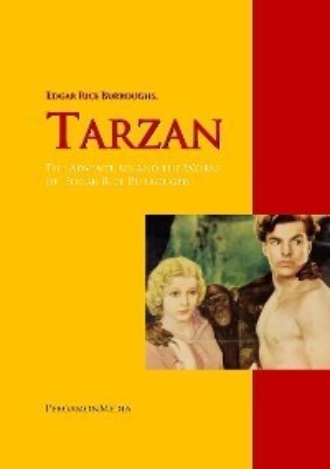
Полная версия
Tarzan: The Adventures and the Works of Edgar Rice Burroughs
The boy followed close upon his heels, his every sense upon the alert, his nerves keyed to the highest pitch of excitement. This was life! For the instant he forgot his resolutions of a few minutes past to hasten to the coast at some other point than that at which he had landed and make his way immediately back to London. He thought now only of the savage joy of living, and of pitting one's wits and prowess against the wiles and might of the savage jungle brood which haunted the broad plains and the gloomy forest aisles of the great, untamed continent. He knew no fear. His father had had none to transmit to him; but honor and conscience he did have and these were to trouble him many times as they battled with his inherent love of freedom for possession of his soul.
They had passed but a short distance to the rear of Numa when the boy caught the unpleasant odor of the carnivore. His face lighted with a smile. Something told him that he would have known that scent among a myriad of others even if Akut had not told him that a lion lay near. There was a strange familiarity—a weird familiarity in it that made the short hairs rise at the nape of his neck, and brought his upper lip into an involuntary snarl that bared his fighting fangs. There was a sense of stretching of the skin about his ears, for all the world as though those members were flattening back against his skull in preparation for deadly combat. His skin tingled. He was aglow with a pleasurable sensation that he never before had known. He was, upon the instant, another creature—wary, alert, ready. Thus did the scent of Numa, the lion, transform the boy into a beast.
He had never seen a lion—his mother had gone to great pains to prevent it. But he had devoured countless pictures of them, and now he was ravenous to feast his eyes upon the king of beasts in the flesh. As he trailed Akut he kept an eye cocked over one shoulder, rearward, in the hope that Numa might rise from his kill and reveal himself. Thus it happened that he dropped some little way behind Akut, and the next he knew he was recalled suddenly to a contemplation of other matters than the hidden Numa by a shrill scream of warning from the Ape. Turning his eyes quickly in the direction of his companion, the boy saw that, standing in the path directly before him, which sent tremors of excitement racing along every nerve of his body. With body half-merging from a clump of bushes in which she must have lain hidden stood a sleek and beautiful lioness. Her yellow-green eyes were round and staring, boring straight into the eyes of the boy. Not ten paces separated them. Twenty paces behind the lioness stood the great ape, bellowing instructions to the boy and hurling taunts at the lioness in an evident effort to attract her attention from the lad while he gained the shelter of a near-by tree.
But Sabor was not to be diverted. She had her eyes upon the lad. He stood between her and her mate, between her and the kill. It was suspicious. Probably he had ulterior designs upon her lord and master or upon the fruits of their hunting. A lioness is short tempered. Akut's bellowing annoyed her. She uttered a little rumbling growl, taking a step toward the boy.
"The tree!" screamed Akut.
The boy turned and fled, and at the same instant the lioness charged. The tree was but a few paces away. A limb hung ten feet from the ground, and as the boy leaped for it the lioness leaped for him. Like a monkey he pulled himself up and to one side. A great forepaw caught him a glancing blow at the hips—just grazing him. One curved talon hooked itself into the waist band of his pajama trousers, ripping them from him as the lioness sped by. Half-naked the lad drew himself to safety as the beast turned and leaped for him once more.
Akut, from a near-by tree, jabbered and scolded, calling the lioness all manner of foul names. The boy, patterning his conduct after that of his preceptor, unstoppered the vials of his invective upon the head of the enemy, until in realization of the futility of words as weapons he bethought himself of something heavier to hurl. There was nothing but dead twigs and branches at hand, but these he flung at the upturned, snarling face of Sabor just as his father had before him twenty years ago, when as a boy he too had taunted and tantalized the great cats of the jungle.
The lioness fretted about the bole of the tree for a short time; but finally, either realizing the uselessness of her vigil, or prompted by the pangs of hunger, she stalked majestically away and disappeared in the brush that hid her lord, who had not once shown himself during the altercation.
Freed from their retreats Akut and the boy came to the ground, to take up their interrupted journey once more. The old ape scolded the lad for his carelessness.
"Had you not been so intent upon the lion behind you you might have discovered the lioness much sooner than you did."
"But you passed right by her without seeing her," retorted the boy.
Akut was chagrined.
"It is thus," he said, "that jungle folk die. We go cautiously for a lifetime, and then, just for an instant, we forget, and—" he ground his teeth in mimicry of the crunching of great jaws in flesh. "It is a lesson," he resumed. "You have learned that you may not for too long keep your eyes and your ears and your nose all bent in the same direction."
That night the son of Tarzan was colder than he ever had been in all his life. The pajama trousers had not been heavy; but they had been much heavier than nothing. And the next day he roasted in the hot sun, for again their way led much across wide and treeless plains.
It was still in the boy's mind to travel to the south, and circle back to the coast in search of another outpost of civilization. He had said nothing of this plan to Akut, for he knew that the old ape would look with displeasure upon any suggestion that savored of separation.
For a month the two wandered on, the boy learning rapidly the laws of the jungle; his muscles adapting themselves to the new mode of life that had been thrust upon them. The thews of the sire had been transmitted to the son—it needed only the hardening of use to develop them. The lad found that it came quite naturally to him to swing through the trees. Even at great heights he never felt the slightest dizziness, and when he had caught the knack of the swing and the release, he could hurl himself through space from branch to branch with even greater agility than the heavier Akut.
And with exposure came a toughening and hardening of his smooth, white skin, browning now beneath the sun and wind. He had removed his pajama jacket one day to bathe in a little stream that was too small to harbor crocodiles, and while he and Akut had been disporting themselves in the cool waters a monkey had dropped down from the over hanging trees, snatched up the boy's single remaining article of civilized garmenture, and scampered away with it.
For a time Jack was angry; but when he had been without the jacket for a short while he began to realize that being half-clothed is infinitely more uncomfortable than being entirely naked. Soon he did not miss his clothing in the least, and from that he came to revel in the freedom of his unhampered state. Occasionally a smile would cross his face as he tried to imagine the surprise of his schoolmates could they but see him now. They would envy him. Yes, how they would envy him. He felt sorry for them at such times, and again as he thought of them amid luxuries and comforts of their English homes, happy with their fathers and mothers, a most uncomfortable lump would arise into the boy's throat, and he would see a vision of his mother's face through a blur of mist that came unbidden to his eyes. Then it was that he urged Akut onward, for now they were headed westward toward the coast. The old ape thought that they were searching for a tribe of his own kind, nor did the boy disabuse his mind of this belief. It would do to tell Akut of his real plans when they had come within sight of civilization.
One day as they were moving slowly along beside a river they came unexpectedly upon a native village. Some children were playing beside the water. The boy's heart leaped within his breast at sight of them—for over a month he had seen no human being. What if these were naked savages? What if their skins were black? Were they not creatures fashioned in the mold of their Maker, as was he? They were his brothers and sisters! He started toward them. With a low warning Akut laid a hand upon his arm to hold him back. The boy shook himself free, and with a shout of greeting ran forward toward the ebon players.
The sound of his voice brought every head erect. Wide eyes viewed him for an instant, and then, with screams of terror, the children turned and fled toward the village. At their heels ran their mothers, and from the village gate, in response to the alarm, came a score of warriors, hastily snatched spears and shields ready in their hands.
At sight of the consternation he had wrought the boy halted. The glad smile faded from his face as with wild shouts and menacing gestures the warriors ran toward him. Akut was calling to him from behind to turn and flee, telling him that the blacks would kill him. For a moment he stood watching them coming, then he raised his hand with the palm toward them in signal for them to halt, calling out at the same time that he came as a friend—that he had only wanted to play with their children. Of course they did not understand a word that he addressed to them, and their answer was what any naked creature who had run suddenly out of the jungle upon their women and children might have expected—a shower of spears. The missiles struck all about the boy, but none touched him. Again his spine tingled and the short hairs lifted at the nape of his neck and along the top of his scalp. His eyes narrowed. Sudden hatred flared in them to wither the expression of glad friendliness that had lighted them but an instant before. With a low snarl, quite similar to that of a baffled beast, he turned and ran into the jungle. There was Akut awaiting him in a tree. The ape urged him to hasten in flight, for the wise old anthropoid knew that they two, naked and unarmed, were no match for the sinewy black warriors who would doubtless make some sort of search for them through the jungle.
But a new power moved the son of Tarzan. He had come with a boy's glad and open heart to offer his friendship to these people who were human beings like himself. He had been met with suspicion and spears. They had not even listened to him. Rage and hatred consumed him. When Akut urged speed he held back. He wanted to fight, yet his reason made it all too plain that it would be but a foolish sacrifice of his life to meet these armed men with his naked hands and his teeth—already the boy thought of his teeth, of his fighting fangs, when possibility of combat loomed close.
Moving slowly through the trees he kept his eyes over his shoulder, though he no longer neglected the possibilities of other dangers which might lurk on either hand or ahead—his experience with the lioness did not need a repetition to insure the permanency of the lesson it had taught. Behind he could hear the savages advancing with shouts and cries. He lagged further behind until the pursuers were in sight. They did not see him, for they were not looking among the branches of the trees for human quarry. The lad kept just ahead of them. For a mile perhaps they continued the search, and then they turned back toward the village. Here was the boy's opportunity, that for which he had been waiting, while the hot blood of revenge coursed through his veins until he saw his pursuers through a scarlet haze.
When they turned back he turned and followed them. Akut was no longer in sight. Thinking that the boy followed he had gone on further ahead. He had no wish to tempt fate within range of those deadly spears. Slinking silently from tree to tree the boy dogged the footsteps of the returning warriors. At last one dropped behind his fellows as they followed a narrow path toward the village. A grim smile lit the lad's face. Swiftly he hurried forward until he moved almost above the unconscious black—stalking him as Sheeta, the panther, stalked his prey, as the boy had seen Sheeta do on many occasions.
Suddenly and silently he leaped forward and downward upon the broad shoulders of his prey. In the instant of contact his fingers sought and found the man's throat. The weight of the boy's body hurled the black heavily to the ground, the knees in his back knocking the breath from him as he struck. Then a set of strong, white teeth fastened themselves in his neck, and muscular fingers closed tighter upon his wind-pipe. For a time the warrior struggled frantically, throwing himself about in an effort to dislodge his antagonist; but all the while he was weakening and all the while the grim and silent thing he could not see clung tenaciously to him, and dragged him slowly into the bush to one side of the trail.
Hidden there at last, safe from the prying eyes of searchers, should they miss their fellow and return for him, the lad choked the life from the body of his victim. At last he knew by the sudden struggle, followed by limp relaxation, that the warrior was dead. Then a strange desire seized him. His whole being quivered and thrilled. Involuntarily he leaped to his feet and placed one foot upon the body of his kill. His chest expanded. He raised his face toward the heavens and opened his mouth to voice a strange, weird cry that seemed screaming within him for outward expression, but no sound passed his lips—he just stood there for a full minute, his face turned toward the sky, his breast heaving to the pent emotion, like an animate statue of vengeance.
The silence which marked the first great kill of the son of Tarzan was to typify all his future kills, just as the hideous victory cry of the bull ape had marked the kills of his mighty sire.
Chapter 7
Akut, discovering that the boy was not close behind him, turned back to search for him. He had gone but a short distance in return when he was brought to a sudden and startled halt by sight of a strange figure moving through the trees toward him. It was the boy, yet could it be? In his hand was a long spear, down his back hung an oblong shield such as the black warriors who had attacked them had worn, and upon ankle and arm were bands of iron and brass, while a loin cloth was twisted about the youth's middle. A knife was thrust through its folds.
When the boy saw the ape he hastened forward to exhibit his trophies. Proudly he called attention to each of his newly won possessions. Boastfully he recounted the details of his exploit.
"With my bare hands and my teeth I killed him," he said. "I would have made friends with them but they chose to be my enemies. And now that I have a spear I shall show Numa, too, what it means to have me for a foe. Only the white men and the great apes, Akut, are our friends. Them we shall seek, all others must we avoid or kill. This have I learned of the jungle."
They made a detour about the hostile village, and resumed their journey toward the coast. The boy took much pride in his new weapons and ornaments. He practiced continually with the spear, throwing it at some object ahead hour by hour as they traveled their loitering way, until he gained a proficiency such as only youthful muscles may attain to speedily. All the while his training went on under the guidance of Akut. No longer was there a single jungle spoor but was an open book to the keen eyes of the lad, and those other indefinite spoor that elude the senses of civilized man and are only partially appreciable to his savage cousin came to be familiar friends of the eager boy. He could differentiate the innumerable species of the herbivora by scent, and he could tell, too, whether an animal was approaching or departing merely by the waxing or waning strength of its effluvium. Nor did he need the evidence of his eyes to tell him whether there were two lions or four up wind,—a hundred yards away or half a mile.
Much of this had Akut taught him, but far more was instinctive knowledge—a species of strange intuition inherited from his father. He had come to love the jungle life. The constant battle of wits and senses against the many deadly foes that lurked by day and by night along the pathway of the wary and the unwary appealed to the spirit of adventure which breathes strong in the heart of every red-blooded son of primordial Adam. Yet, though he loved it, he had not let his selfish desires outweigh the sense of duty that had brought him to a realization of the moral wrong which lay beneath the adventurous escapade that had brought him to Africa. His love of father and mother was strong within him, too strong to permit unalloyed happiness which was undoubtedly causing them days of sorrow. And so he held tight to his determination to find a port upon the coast where he might communicate with them and receive funds for his return to London. There he felt sure that he could now persuade his parents to let him spend at least a portion of his time upon those African estates which from little careless remarks dropped at home he knew his father possessed. That would be something, better at least than a lifetime of the cramped and cloying restrictions of civilization.
And so he was rather contented than otherwise as he made his way in the direction of the coast, for while he enjoyed the liberty and the savage pleasures of the wild his conscience was at the same time clear, for he knew that he was doing all that lay in his power to return to his parents. He rather looked forward, too, to meeting white men again—creatures of his own kind—for there had been many occasions upon which he had longed for other companionship than that of the old ape. The affair with the blacks still rankled in his heart. He had approached them in such innocent good fellowship and with such childlike assurance of a hospitable welcome that the reception which had been accorded him had proved a shock to his boyish ideals. He no longer looked upon the black man as his brother; but rather as only another of the innumerable foes of the bloodthirsty jungle—a beast of prey which walked upon two feet instead of four.
But if the blacks were his enemies there were those in the world who were not. There were those who always would welcome him with open arms; who would accept him as a friend and brother, and with whom he might find sanctuary from every enemy. Yes, there were always white men. Somewhere along the coast or even in the depths of the jungle itself there were white men. To them he would be a welcome visitor. They would befriend him. And there were also the great apes—the friends of his father and of Akut. How glad they would be to receive the son of Tarzan of the Apes! He hoped that he could come upon them before he found a trading post upon the coast. He wanted to be able to tell his father that he had known his old friends of the jungle, that he had hunted with them, that he had joined with them in their savage life, and their fierce, primeval ceremonies—the strange ceremonies of which Akut had tried to tell him. It cheered him immensely to dwell upon these happy meetings. Often he rehearsed the long speech which he would make to the apes, in which he would tell them of the life of their former king since he had left them.
At other times he would play at meeting with white men. Then he would enjoy their consternation at sight of a naked white boy trapped in the war togs of a black warrior and roaming the jungle with only a great ape as his companion.
And so the days passed, and with the traveling and the hunting and the climbing the boy's muscles developed and his agility increased until even phlegmatic Akut marvelled at the prowess of his pupil. And the boy, realizing his great strength and revelling in it, became careless. He strode through the jungle, his proud head erect, defying danger. Where Akut took to the trees at the first scent of Numa, the lad laughed in the face of the king of beasts and walked boldly past him. Good fortune was with him for a long time. The lions he met were well-fed, perhaps, or the very boldness of the strange creature which invaded their domain so filled them with surprise that thoughts of attack were banished from their minds as they stood, round-eyed, watching his approach and his departure. Whatever the cause, however, the fact remains that on many occasions the boy passed within a few paces of some great lion without arousing more than a warning growl.
But no two lions are necessarily alike in character or temper. They differ as greatly as do individuals of the human family. Because ten lions act similarly under similar conditions one cannot say that the eleventh lion will do likewise—the chances are that he will not. The lion is a creature of high nervous development. He thinks, therefore he reasons. Having a nervous system and brains he is the possessor of temperament, which is affected variously by extraneous causes. One day the boy met the eleventh lion. The former was walking across a small plain upon which grew little clumps of bushes. Akut was a few yards to the left of the lad who was the first to discover the presence of Numa.
"Run, Akut," called the boy, laughing. "Numa lies hid in the bushes to my right. Take to the trees. Akut! I, the son of Tarzan, will protect you," and the boy, laughing, kept straight along his way which led close beside the brush in which Numa lay concealed.
The ape shouted to him to come away, but the lad only flourished his spear and executed an improvised war dance to show his contempt for the king of beasts. Closer and closer to the dread destroyer he came, until, with a sudden, angry growl, the lion rose from his bed not ten paces from the youth. A huge fellow he was, this lord of the jungle and the desert. A shaggy mane clothed his shoulders. Cruel fangs armed his great jaws. His yellow-green eyes blazed with hatred and challenge.
The boy, with his pitifully inadequate spear ready in his hand, realized quickly that this lion was different from the others he had met; but he had gone too far now to retreat. The nearest tree lay several yards to his left—the lion could be upon him before he had covered half the distance, and that the beast intended to charge none could doubt who looked upon him now. Beyond the lion was a thorn tree—only a few feet beyond him. It was the nearest sanctuary but Numa stood between it and his prey.
The feel of the long spear shaft in his hand and the sight of the tree beyond the lion gave the lad an idea—a preposterous idea—a ridiculous, forlorn hope of an idea; but there was no time now to weigh chances—there was but a single chance, and that was the thorn tree. If the lion charged it would be too late—the lad must charge first, and to the astonishment of Akut and none the less of Numa, the boy leaped swiftly toward the beast. Just for a second was the lion motionless with surprise and in that second Jack Clayton put to the crucial test an accomplishment which he had practiced at school.
Straight for the savage brute he ran, his spear held butt foremost across his body. Akut shrieked in terror and amazement. The lion stood with wide, round eyes awaiting the attack, ready to rear upon his hind feet and receive this rash creature with blows that could crush the skull of a buffalo.
Just in front of the lion the boy placed the butt of his spear upon the ground, gave a mighty spring, and, before the bewildered beast could guess the trick that had been played upon him, sailed over the lion's head into the rending embrace of the thorn tree—safe but lacerated.
Akut had never before seen a pole-vault. Now he leaped up and down within the safety of his own tree, screaming taunts and boasts at the discomfited Numa, while the boy, torn and bleeding, sought some position in his thorny retreat in which he might find the least agony. He had saved his life; but at considerable cost in suffering. It seemed to him that the lion would never leave, and it was a full hour before the angry brute gave up his vigil and strode majestically away across the plain. When he was at a safe distance the boy extricated himself from the thorn tree; but not without inflicting new wounds upon his already tortured flesh.
It was many days before the outward evidence of the lesson he had learned had left him; while the impression upon his mind was one that was to remain with him for life. Never again did he uselessly tempt fate.






